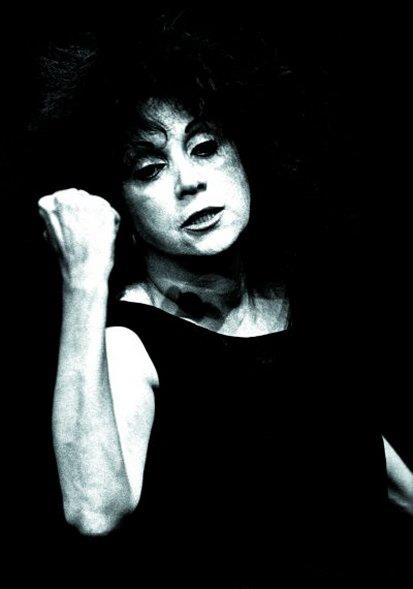 Judith Malina, co-founder of the legendary Living Theatre, a ground-breaking and activist-oriented troupe that helped pioneer the countercultural explosion of the 1960s and still challenges audiences today, died April 10 at the Lillian Booth Actors Home in Englewood, NJ. She was 88 and still actively involved in the Living Theatre. This remembrance is offered by Baba Israel, a New York-based hip-hop artist and cultural worker whose parents were core members of the Living Theatre. —Global Ganja Report
Judith Malina, co-founder of the legendary Living Theatre, a ground-breaking and activist-oriented troupe that helped pioneer the countercultural explosion of the 1960s and still challenges audiences today, died April 10 at the Lillian Booth Actors Home in Englewood, NJ. She was 88 and still actively involved in the Living Theatre. This remembrance is offered by Baba Israel, a New York-based hip-hop artist and cultural worker whose parents were core members of the Living Theatre. —Global Ganja Report
I was born into the Living Theatre. My earliest years were with them in Brooklyn, Vermont, and Pittsburgh. It was a childhood of street theatre and protest. One of the pivotal figures in my early life and in the lives of my parents was the great Judith Malina. Judith, co-founder of the Living Theatre, started with the late Julian Beck, in 1947, in New York City. Her uncompromising commitment as director, actor, activist exerted a powerful influence on everyone around her. She was one of those rare people who radiated strength, intelligence and passion in everything that she did.
I have built my own life as an artist and educator by combining my generation's form of Hip Hop with the theatrical and political impulses of my family. I moved back to New York in 2012, when my father, Steve Ben Israel, a longtime collaborator of Judith's, passed away. I returned to look after my mother, another former member of the company, to begin creating a performance about my father and his history, including his days with the Living Theatre. As I immersed myself in the material, I started to reconnect with this radical community that was a huge foundation in my life.
I went to a Seder with Judith last year at the house of Leah Bachar, a new-generation Living Theatre member. It brought home how much the Living Theatre and particularly Judith’s remix of the Haggadah is a foundation of my sense of ritual and ethics. In the Living Theatre, the Seder is a ritual celebrating freedom and also a chance to collectively shout "Ginsberg," to recognize current struggles for liberation and to experience artists reciting the Haggadah with theatrical flair in an open space where we would share song and story.
Judith's unwavering commitment to nonviolence, to a utopian possibility, to a deep anarchist perspective, to stay connected to younger generations, to scream with unrelenting love and belief in human possibility, to say we must end the cycle of vengeance and violence, has deeply informed my life as father, husband, friend and artist.
I last saw Judith December 7, 2014 at the Bowery Poetry Club reading new poems. Her words revealed a continued insight into our world, into the horrors and into the beautiful possibilities. She ended with a piece about Eric Garner and the protests in the streets and the chant of "I can't breathe." I felt proud that Judith, at 88, was still in tune and speaking solidarity to confront the injustice rampant in our country.
For Judith
You wrote the revolutionary Haggadah that shaped my sense of liberation
My aunt in a nomadic family
A keeper of legacy
of poetic fire
of unrelenting spirit and commitmentYou were locked up with my mom in Brazil in the 1970's
Your crime
as always political theatre in the streetsMy heart is heavy
Julian has passed
pops has passed
you have passed
myths that guide my dreams
A Living Theatre beyond stages
that sinks into psyche like acid
like liberations sensual eyes
a riff a jazz motif a call of skin, dream, ritual and smokeI heard you
new poems written at 88
I can't breathe!Your tiny frame filled with life even in a wheelchair your voice proclaiming
resisting
a laugh
a smile
as you touched my daughters hand
eyes deep
Looking for the signs of wonder amidst the signs of doomI saw you 87 years old
Washington Square Park
eyes afire as the Living danced with artists, nyu students, workers on the way homeA call to step from spectator into voice and collective action
I still hear you Judith
I always will
Photo via Facebook







Comments
Judith Malina obituaries
For more on Judith Malina's life, see her obituaries in The Villager, The Forward and the New York Times.